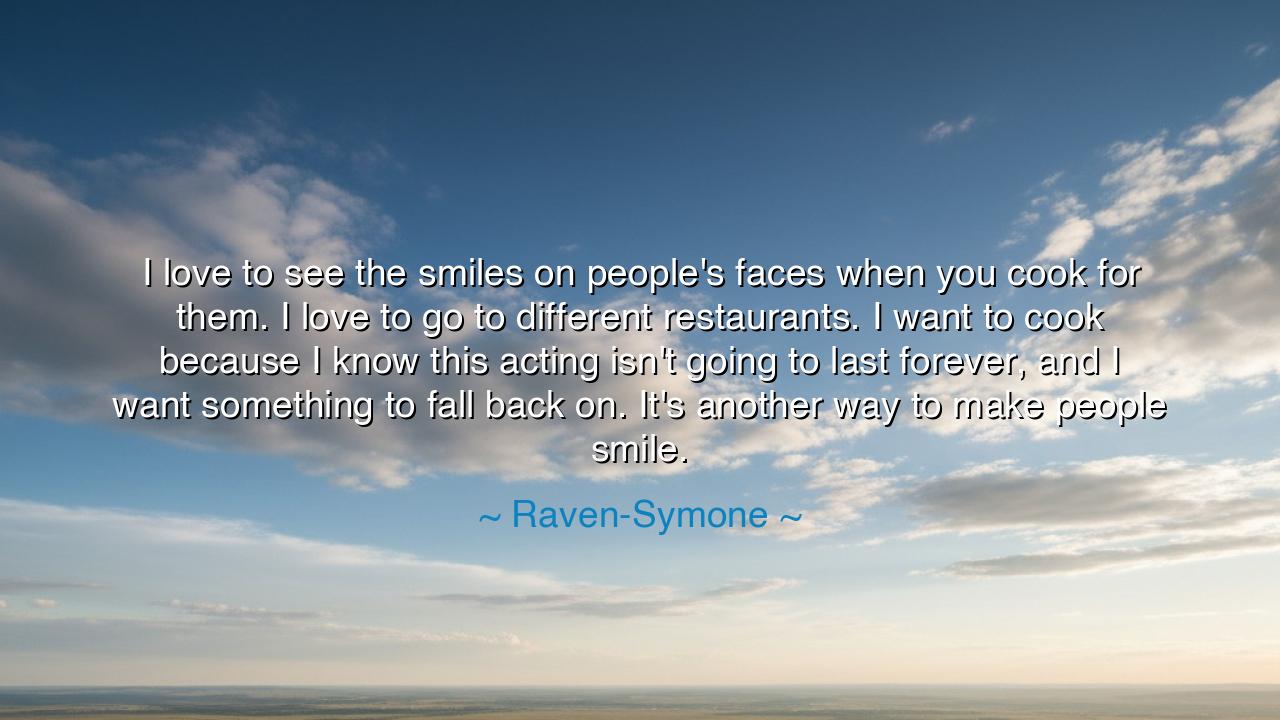
I love to see the smiles on people's faces when you cook for
I love to see the smiles on people's faces when you cook for them. I love to go to different restaurants. I want to cook because I know this acting isn't going to last forever, and I want something to fall back on. It's another way to make people smile.






Raven-Symoné, with the heart of both artist and giver, once spoke: “I love to see the smiles on people’s faces when you cook for them. I love to go to different restaurants. I want to cook because I know this acting isn’t going to last forever, and I want something to fall back on. It’s another way to make people smile.” In these words shines a wisdom that transcends profession: that the truest measure of any craft—whether in acting upon the stage or in cooking at the hearth—is the ability to bring joy to others. Fame may fade, applause may dim, but the gift of the smile is eternal.
The ancients would have recognized this truth. In every culture, the act of sharing food has been sacred. To cook for another is not merely to feed the body, but to nourish the soul, to create a bond that no words alone can form. The breaking of bread was a sign of covenant, of kinship, of unity. Raven-Symoné, though born into the modern world of lights and cameras, returns to this timeless truth: that while acting may entertain for a season, cooking can sustain for a lifetime. Both are art forms, but one is the fire of the stage, the other the fire of the hearth.
History gives us witness to this. Consider the story of Julia Child, who brought French cooking into American homes. She was not merely a chef, but a bringer of joy, teaching people that cooking was an act of love. Her laughter, her mistakes, even her clumsiness—all of these made her human, and through her, people discovered the power of food to make them smile. Like Raven-Symoné, she understood that beyond technique lay the higher purpose: to create happiness in others.
There is also a humility in Raven-Symoné’s words. She does not cling to the illusion that acting is forever. She acknowledges that art, fame, and the spotlight are fleeting, and thus seeks another path to continue her purpose. This is not defeat, but wisdom. For the wise know that one must not tie their entire worth to one field alone, but find multiple ways to live meaningfully. Her vision of cooking is not a step down from acting, but another noble form of creation, another way to carry light into the world.
The lesson here is profound: your greatest gift is not your talent itself, but the joy you awaken in others through it. Whether on stage, in the kitchen, or in daily kindness, what endures is not the applause or recognition, but the smile left behind. To measure success by joy given rather than accolades received is to walk the path of true greatness.
Practical counsel arises from this: cultivate more than one way to serve, more than one art to offer. Do not anchor your soul to a single identity, for life’s seasons shift. Instead, let your deeper purpose—the desire to create joy—guide you. If one door closes, open another. Learn new crafts, practice them with love, and let each become a channel through which others may smile.
Therefore, O listener, take Raven-Symoné’s teaching to heart: do not chase permanence in things that are fleeting, but chase permanence in the joy you give. Whether through acting, cooking, music, teaching, or kindness, seek always the smile on the face of another. For that smile is the true legacy, more lasting than fame, more nourishing than wealth, and more radiant than any stage light could ever be.






AAdministratorAdministrator
Welcome, honored guests. Please leave a comment, we will respond soon